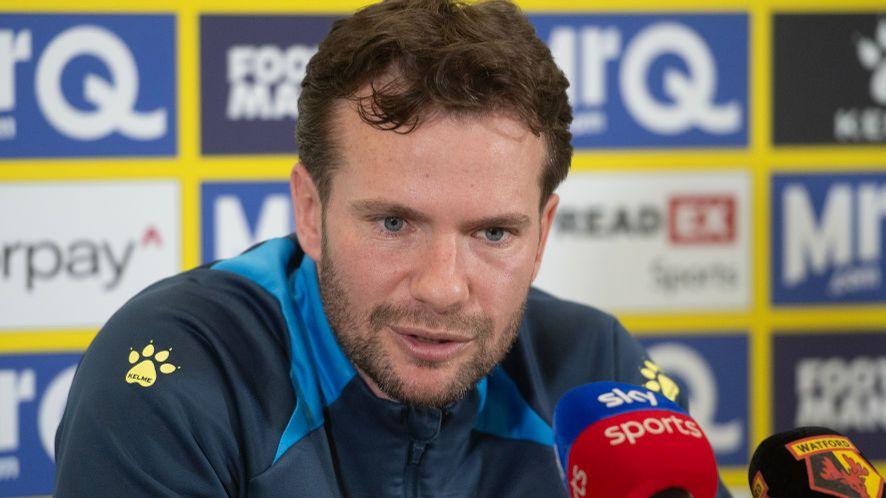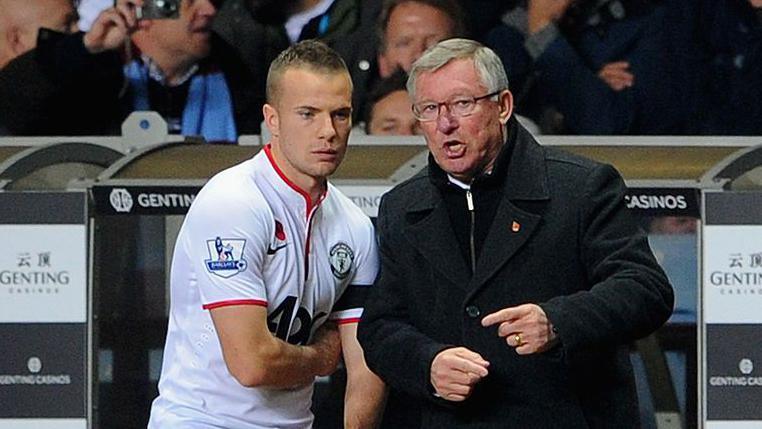I lacked ambition as a player but not as a coach - Cleverley

Watford interim manager Tom Cleverley won 13 England caps and the Premier League with Manchester United in 2012–13
- Published
Tom Cleverley is not daunted by the names of discarded Watford managers that litter the club’s recent history.
The former Manchester United, Watford and England midfielder has been in interim charge for seven games since Valerien Ismael was sacked in March.
Ismael’s exit left the club looking for their 11th head coach since 2018 and eighth since the end of the 2020-21 season.
Of Watford's past 10 bosses, only Ismael and Xisco Munoz stayed in the job for longer than 30 games.
Cleverley is 34 and only retired last year. He keeps tangible reminders of his football career at home in his office like his Premier League title medal and 11 England caps – the other two are with his mum and dad.
Others are stored in his head; 379 senior appearances for six clubs, 35 goals. Olympic memories from 2012.
But it is not enough. It gnaws away at him. It is why he was fully prepared when he took over as Watford Under-18s boss last summer after giving up the battle with his body.
Senior figures at the Championship club could see the impact Cleverley was having. It made him the automatic choice as interim boss and now a strong contender for the permanent role.
“There is a lot of unfinished business from my playing career,” he explains in an interview with BBC Sport. “That drives me forward with my coaching. It motivates me every day.
“I didn’t achieve anything in the Champions League with Manchester United. The title we lost to City. I came to Watford when they were in the Premier League. I retired as a player with them in the Championship. None of it sits right.
“I left a few out there as a player. I probably lacked ambition. But as a coach I am very ambitious.”
Cleverley has not been short of big-name advice.
When he got the Watford Under-18s job, former boss Sir Alex Ferguson was soon in touch.
“He gave me a couple of great pieces of advice about on-field coaching, but the main thing I take away from him is man-management,” said Cleverley. “Football is not just about 11 players. You need harmony from a full squad. He was a genius at doing that.”

Tom Cleverley broke into the Manchester United first team under Sir Alex Ferguson in 2008
After Watford’s Good Friday draw with Leeds, Honorary Life-President Elton John gave him a call.
“Elton is great,” he said. “He said how much he enjoyed it and how much he enjoyed a Watford man being in charge. He knows how passionate I am about the club.”
Almost half of Cleverley’s professional appearances came for Watford. Along with Manchester United, managing them was a clear aim when he swerved the post-playing-career media world.
“I love the feeling of working towards something every day, whether that is a result, a relegation battle, a title charge,” he said. “Football has been my life since I was a kid. I like being on the inside of a club, having real impact, doing the nitty-gritty on the grass, taking the tactical aspects of training, enjoying the little game of chess football is becoming now.”
He is not enjoying the travails currently being experienced at Old Trafford.
“I go back to environment,” he said. “Look at the dressing rooms of Liverpool and Manchester City.
“I don’t think they [United] are that far away in terms of quality, but when you look at how people react to mistakes, to going behind, to poor form, it is chalk and cheese. They are a long way behind the other two.”
United is not his concern just now - his immediate task is navigating the final two games of a difficult Championship campaign for the Hornets.
His record so far is one win, one defeat and five draws, the latest against Hull.
And while short tenures are not exclusive to Watford, Cleverley knows the time to make an impression is limited.
“I approach it with an incredible amount of self-belief,” he said. “I feel like I am the guy who can get it right, I am the one who can take it forward.
“I don’t know it all, far from it, but we have a clear vision about where we can improve the team and we have a longer-term plan, if needed, for where we can get to.”
Cleverley is still waiting to be told whether he will be given the job on a permanent basis. And as the first of the new breed, totally conversant with the social media age, he knows managerial techniques of the past on their own will not work any more.
“That is where my time in the academy really helped,” he said. “Even the younger generation below the first-team players don’t seem to respond to fear as much as they did in my time.
“For me it was respect, scared, react, do the business, in that order. Now you lose people a bit more through fear. You need to show players you want to help. That is how you get a response. That is my style. I am not saying it is right or wrong, but it is my way and I will stick to it.”